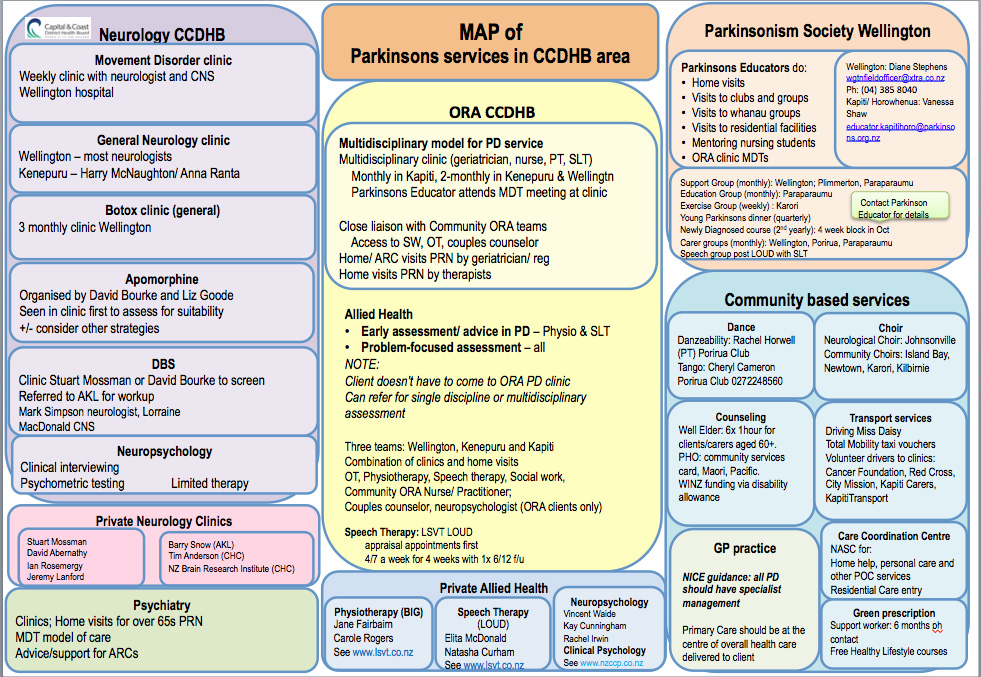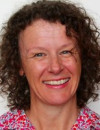Dr Scott was winner of the Parkinson’s Academy MasterClass Project 2016. The Parkinson’s Academy intermodule project is an integral part of the Advanced MasterClass. Course participants choose an area of interest which might be around service delivery, patient or drug management and present their findings at Module 2 to the faculty and other participants who select the winner. Dr Scott won the 2016 MasterClass Award for her project “Knowing our own business” which created a Map of Services of her older adults Parkinson’s service in New Zealand.
In Wellington, New Zealand, our Older Adult service runs three Parkinson’s clinics. In choosing an improvement project, the author reflected that she needed to clarify some basic information before any other improvement was planned:
- Who the patients are
- What they want
- How the clinics fit in with the other services available for Parkinson’s patients.
In order to answer the first question (Who are our patients?) a database for the Older Adult Parkinson’s service was constructed. The initial database is on Excel while awaiting a clever database designed by the IT department.
Creation of this has had the following effects:
- We now know how many patients, their age range, what stage and type of Parkinson’s they have, and the referral patterns in our service.
- We now know from which suburbs, medical centres and GPs our patients come.
- We know see the differences and similarities between the two clinic populations.
- Consultation and conversations with our staff have triggered service planning, especially:
- Clearly defining our service’s role in contrast to, and to complement that of, Neurology
- The need for our involvement in the palliative stage for those in care homes
- Getting local figures to show what population extrapolations suggest: we are missing a large proportion of patients who should be under our care
- How and where to focus education into primary care.
The second question (What do our patients want?) requires a qualitative project, which had already been planned by a colleague. The author encouraged and facilitated the initiation of this project.
The third question (How does our service fit in?) was answered by creating a one-page visual Map of Services – click on the image to enlarge.

The intended audience is all those who provide Parkinson’s care within the catchment. It became apparent that no one delivering Parkinson’s-related care had a clear and detailed appreciation of all the services available, prior to the Map. Two addenda to this project will be a version for patients/ carers; and to convert the Map to a wholly digital form with hyperlinks to all referral processes.
Creation of the Map required much consultation and this too had ripple effects:
- Consultation with the Neurology service prompted a neurologist and specialist nurse to set up a local Apomine service (previously there was none)
- Consultation with the Psychiatry service prompted a psychogeriatrician to further plans for a Clozapine service for older adults (currently there is none)
- Consultation with allied health therapists and geriatricians prompted our service to start offering a “once-over” by physiotherapy and speech therapy to all new patients presenting to any service.
- Relationships and understandings were significantly strengthened
- Referral pathways were clarified
- A Parkinson’s Clinical Pathway for our catchment is now planned
The project provided a number of insights for the author. In particular, the significant advantage of doing work to establish a clear understanding of “our own business” as the first step in quality improvement work. The project required wide consultation, revealing that others were equally isolated in their knowledge. The consultation process allowed services to explain to each other their roles and aspirations, and triggered other individuals to get on with their improvement work, including our own service to engage properly with service planning for the future. This underlined the importance of doing quality improvement collaboratively rather than in splendid isolation. The outcomes made the way clear as to where attention needs to be focused next. Attending the Academy’s Masterclass with the brief to complete a project provided the impetus to do this work and do it in a timely manner: one of the many valuable effects of the active, engaging style of continuing education inherent in the masterclass.

